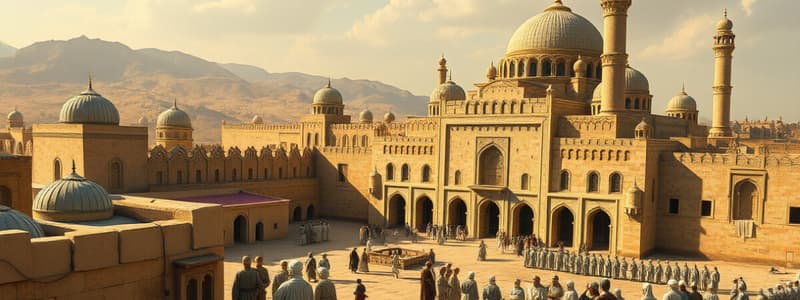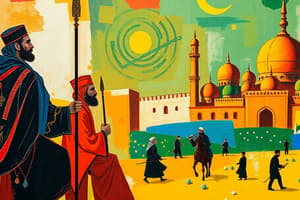Podcast
Questions and Answers
What is the name for the call to prayer in Arabic, Turkish, and Persian?
What is the name for the call to prayer in Arabic, Turkish, and Persian?
- Hajj
- Azan (correct)
- Salah
- Zakah
What were the Ridda Wars fought against?
What were the Ridda Wars fought against?
Rebellious Arab tribes after Muhammad died.
Who was Abu Bakr?
Who was Abu Bakr?
The first caliph to succeed Muhammad.
What was the outcome of the Battle of Qadisiya?
What was the outcome of the Battle of Qadisiya?
Who was Umar?
Who was Umar?
What city was the second capital of the Rashidun Caliphate?
What city was the second capital of the Rashidun Caliphate?
What was Fustat?
What was Fustat?
What is the Dome of the Rock?
What is the Dome of the Rock?
What is the Al Aqsa Mosque?
What is the Al Aqsa Mosque?
Who was Uthman?
Who was Uthman?
Who was Ali?
Who was Ali?
What was the First Fitna?
What was the First Fitna?
What does Zulfiqar symbolize?
What does Zulfiqar symbolize?
What is Takfir?
What is Takfir?
What does Dar-al-Islam refer to?
What does Dar-al-Islam refer to?
Who are the Rashidun Caliphs?
Who are the Rashidun Caliphs?
What was Ashura known for?
What was Ashura known for?
What was the Second Fitna?
What was the Second Fitna?
Flashcards are hidden until you start studying
Study Notes
Key Terms and Definitions
-
Adhan/Ezan/Azan: The call to prayer in Arabic, Turkish, and Persian respectively, marking the time for mandatory worship.
-
Ridda Wars: Also known as the 'Wars of Apostasy', these conflicts were initiated by Abu Bakr to combat rebellious Arab tribes after Muhammad's death, aiming to restore unity to the Muslim state.
-
Abu Bakr: First caliph and father-in-law of Muhammad; instrumental in unifying Arabia during the Ridda Wars; died shortly after his leadership began.
-
Battle of Qadisiya: Significant confrontation in 636 between Muslims and the Persian Empire, resulting in a major Muslim victory and subsequent control over Mesopotamia.
-
Umar: Second Rashidun Caliph; expanded the Islamic territory extensively, capturing nearly the entirety of the Persian Sassanian and much of the Byzantine Empires; assassinated by a Persian prince.
-
Kufa: A major city and the second capital of the Rashidun Caliphate, established in Mesopotamia.
-
Fustat: The first capital of Egypt during the Muslim rule, established as a political and military center.
-
Dome of the Rock: An iconic mosque in Jerusalem atop the Foundation Stone, believed to be the site of Muhammad’s ascension to Heaven, making it a key religious site in Islam.
-
Al Aqsa Mosque: A prominent mosque situated opposite the Dome of the Rock on Jerusalem's Temple Mount.
-
Uthman: Third Rashidun Caliph; faced controversy due to his slow conversion to Islam and appointing family to government positions, leading to discord; he was eventually assassinated.
-
Ali: Fourth and last of the Rashidun Caliphs; son-in-law of Muhammad, seen as his rightful successor; conflict with Uthman's supporters sparked the First Fitna.
-
First Fitna: A civil war within the caliphate between supporters of Uthman and Ali, leading to the emergence of the first Umayyad caliphate.
-
Zulfiqar: A distinctive double-headed sword of Ali, which symbolizes Shia Islam.
-
Takfir: The practice of declaring another individual to be non-Muslim.
-
Dar-al-Islam: Translated as "House of Islam", referring to regions governed by Islamic law or where Islam is the predominant faith.
-
Rashidun Caliphs: The first four caliphs considered as 'rightly guided': Abu Bakr, Umar, Uthman, and Ali.
-
Ashura: Commemoration of the martyrdom of Husayn ibn Ali at the Battle of Karbala, marking a tragic event for Shia Muslims, often observed through acts of mourning.
-
Second Fitna: A tumultuous period following the death of Muawiyah I, characterized by political unrest within the early Umayyad Caliphate.
Studying That Suits You
Use AI to generate personalized quizzes and flashcards to suit your learning preferences.




